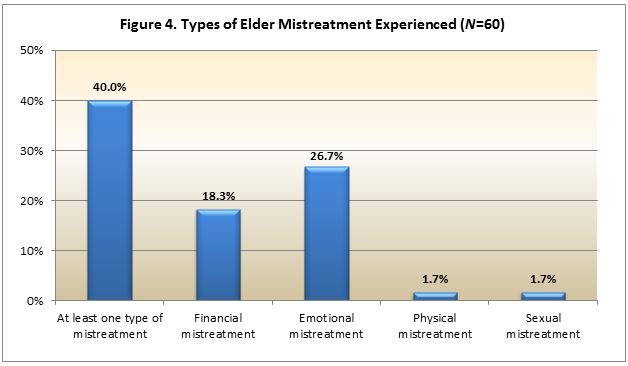Many AAPI leaders list elder abuse as a top 10 priority issue according to a National Asian Pacific Center on Aging (NAPCA) survey of community-ased organizations. However, elder abuse is not well addressed in the AAPI communities. How much do we know about the seriousness of elder abuse in the AAPI community? Do AAPI elders experience elder abuse differently from other older adults because of their language barriers and cultural background?
A recent research study sponsored by the University of Northern Iowa examined life experiences in elder mistreatment and the perceptions and help-seeking behaviors among Asian American and Pacific Islander (AAPI) older adults. The research respondents were participants from the Senior Community Service Employment Program (SCSEP) at National Asian Pacific Center on Aging (NAPCA). As a pilot study, the sample was drawn from Los Angeles and Orange County, California SCSEP participants. The participants’ eligibility requirements were low-income (below 125% of federal poverty guidelines) and 55 years old and older.
The study participants maintained independent living in the community, and more than 80% of them were able to take care of their bills. Their living arrangement would suggest a low risk of being mistreated; however, the major findings showed otherwise with a focus on emotional mistreatment and financial mistreatment:
- 40% of research participants experienced at least one type of mistreatment during the past 12 months. The most experienced mistreatment was emotional mistreatment (26.7%), followed by financial (17.3%), physical (1.7%), and sexual (1.7%) mistreatment.
- Regarding their perceptions about elder mistreatment, a large majority of respondents (78.3%) perceived family members telling them about sending them to nursing homes against their will as elder mistreatment. However, less than 40% of respondents answered that adult children borrowing money but not paying them back is elder mistreatment.
- In terms of help-seeking behaviors, most study participants (71.7%) chose family as the first people they would ask for help.
- Unfortunately, more than 60% of respondents were not able to identify resources such as organizations or professionals for help in case of elder mistreatment.
The study findings implied several suggestions.
- Early detection and intervention for emotional and financial mistreatment among AAPI older adults are important.
- Elder mistreatment services and education for AAPI communities must be culturally and linguistically customized.
- Services for elder mistreatment need collaborative partnerships between AAPI community- based organizations and Adult Protection Services (APS).
An executive summary of this research study is available on the NAPCA website.
The opinions expressed in this article are those of the author and do not necessarily reflect those of the Diverse Elders Coalition.


